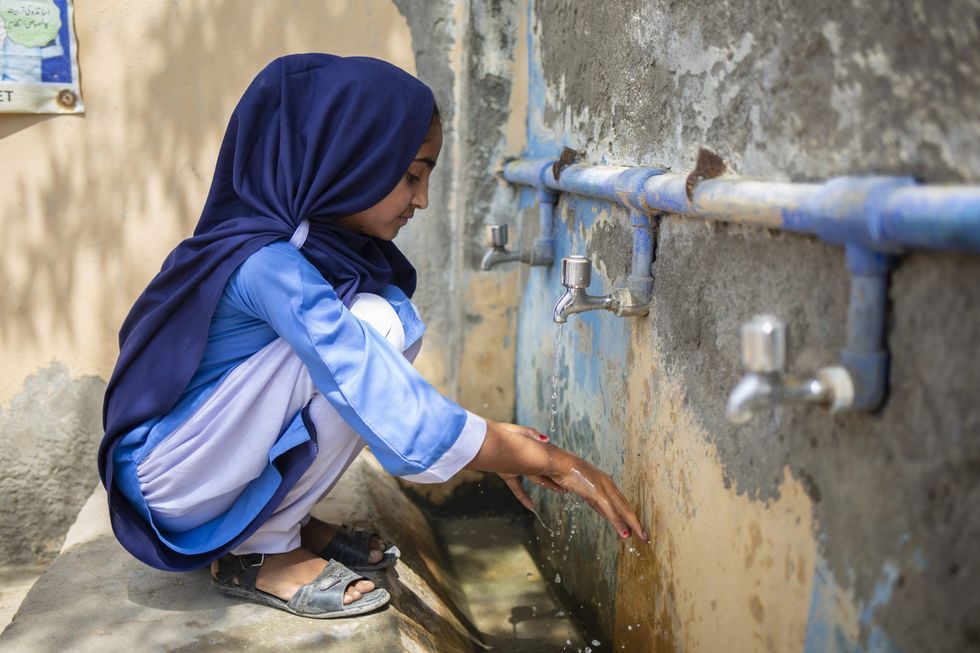WaterAid's annual Zakat appeal aims to assist climate-vulnerable communities affected by the aftermath of climate change in Pakistan, Bangladesh, and Mali.
In particular, the worst monsoon floods in Pakistan's history left an estimated 33 million people in need of clean water, decent sanitation, and good hygiene.
As part of this campaign, WaterAid is urging supporters to contribute towards providing these essential resources to schools, communities, and healthcare centres in the affected regions.
The dire situation in Pakistan is alarming, as 1 in 10 people lack access to clean water and 1 in 3 don't have proper sanitation facilities. Climate change is further exacerbating the issue, with floods polluting water sources and droughts drying them up.
This lack of clean water, sanitation, and hygiene puts lives at risk, with over 19,400 children dying every year in Pakistan due to diseases caused by unclean water and poor sanitation.
WaterAid's Zakat appeal aims to address this issue by providing clean water, sanitation, and hygiene to vulnerable communities affected by climate change, ensuring the health of children and the resilience of entire communities in the face of an uncertain future.
The organisation is working in the Muzaffargarh district of southern Punjab province, a region particularly susceptible to climate change.

Community leader Ghulam Fareed, 76, lives in Nuhan Wala village, which has been without clean water for two decades. Villagers must travel 2-3 kilometres to access water from a pipeline linked to a sugar mill, which is contaminated with sulphur and unfit for consumption.
Tragically, the 2010 floods have depleted the quantity and quality of this water, making life even more difficult for the village's residents.
WaterAid collaborates with partners in 27 countries globally to make a positive impact on millions of lives each year by enhancing access to clean water, sanitation, and hygiene.
The organisation is supported by offices in various countries such as the UK, US, Australia, Sweden, Canada, Japan, and India.
A press release states that although installing taps and toilets is a critical aspect of their work, WaterAid goes beyond that. They also work with governments to change policies, connect policymakers with people in the field, share expertise and resources, and gain support from individuals and organisations worldwide to create long-term, meaningful change.
WaterAid recognises the growing number of Muslim donors, networks, and communities interested in supporting their work through donating Sadaqah (voluntary charity) or Zakat, an obligatory alms tax in Islam (the 3rd pillar of Islam) based on wealth, savings, and investments, including trade goods, crops, livestock, and minerals exceeding a certain minimum threshold.
The organisation has established a Zakat policy to ensure that Muslims can confidently support WaterAid's critical and life-saving work while fulfilling their religious obligations.
Through its Zakat appeal, WaterAid is implementing a new water filtration system in Ghulam's village to establish a clean water supply.
WaterAid has already constructed four additional water filtration plants in other parts of the district to eliminate contamination from water sources, and the organisation has trained community members to maintain these plants over the long term.
With the support of this year's Zakat appeal, at least 15,000 more individuals across ten communities, who are impacted by climate change in the Muzaffargarh district, will have access to clean water, adequate sanitation, and good hygiene.
Furthermore, WaterAid is also working in five schools within the district to provide new water, sanitation, and hygiene facilities for up to 1,000 students.
The organisation is conducting vital hygiene education sessions for the next generation to empower them to maintain good health and well-being.
Bushra, a 10-year-old from Hussain Jamali Wala, is a role model who has benefited from WaterAid's school hygiene education sessions.
She has been sharing her knowledge with her family, classmates, and the wider community, inspiring them to adopt basic hygiene practices, such as handwashing, to protect themselves from future infections.
This Ramadan, donating to WaterAid will support people like Ghulam and Bushra and fund projects that align with Zakat principles.
In Bangladesh, supporters can provide clean water, taps, and sanitation facilities to up to 50 Madrassas in vulnerable districts like Gaibandha, Sunmgonj, and Khulna that are affected by climate change.
In Mali, donations will help bring clean water, sanitation, and hygiene to healthcare centers in Kati and Bla districts, providing new water systems, and training healthcare workers.
WaterAid's Zakat campaign in the previous year generated over £181,000 in donations. This year, to expand on this achievement, WaterAid will once again collaborate with the Emerald Network, the UK's oldest Muslim professional network, to extend the reach of their campaign and provide more people with access to clean water.
Arif Jabbar Khan, Country Director of WaterAid Pakistan, emphasised the importance of access to clean water, decent sanitation, and good hygiene as a basic human right.
He expressed gratitude to Zakat donors for their support in providing relief to communities affected by floods last year and encouraged continued support to help vulnerable communities build resilience against climate change.
He highlighted the positive impact of access to clean water on health, education, and women's empowerment, and called for collective action to make lasting change to whole communities.

















